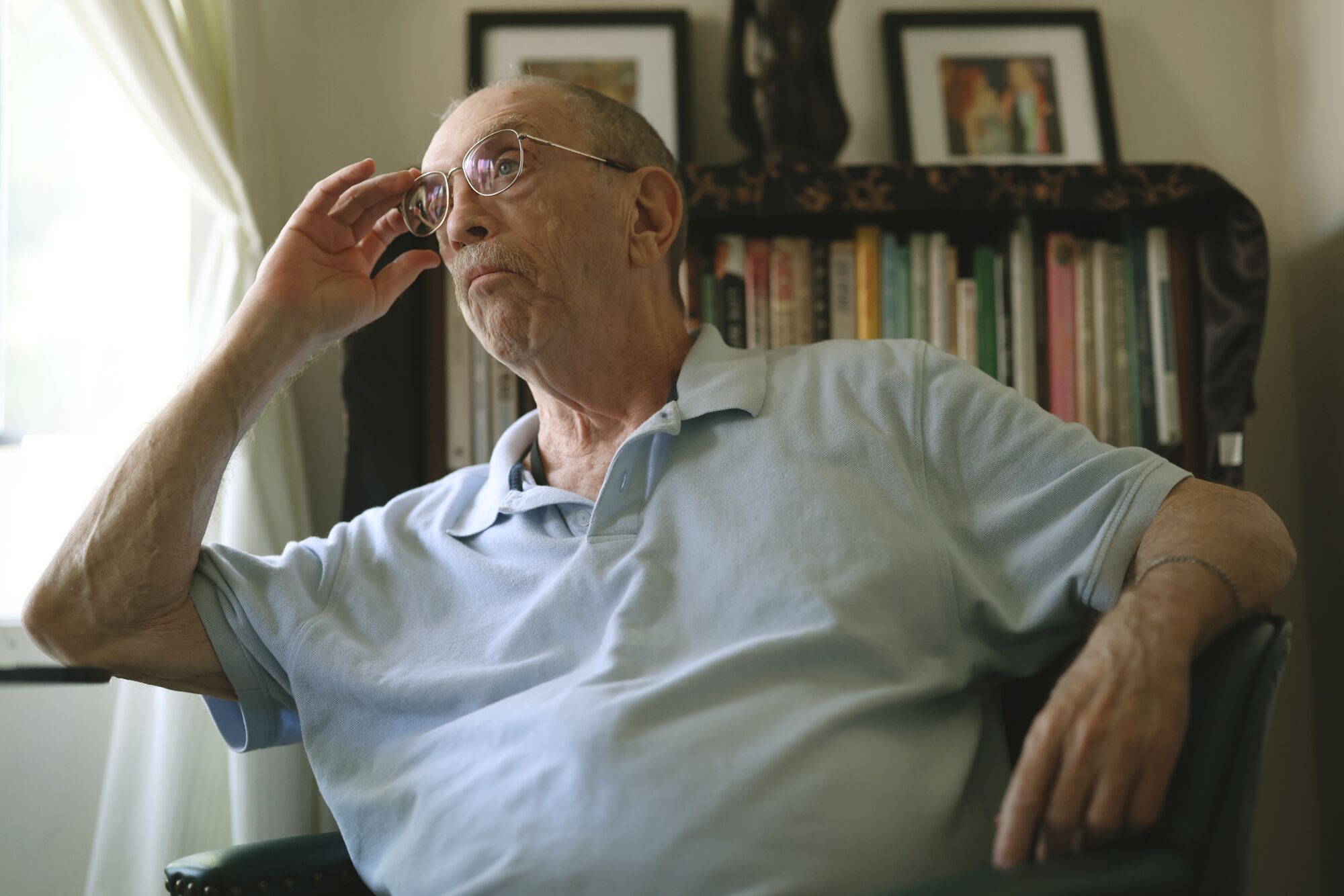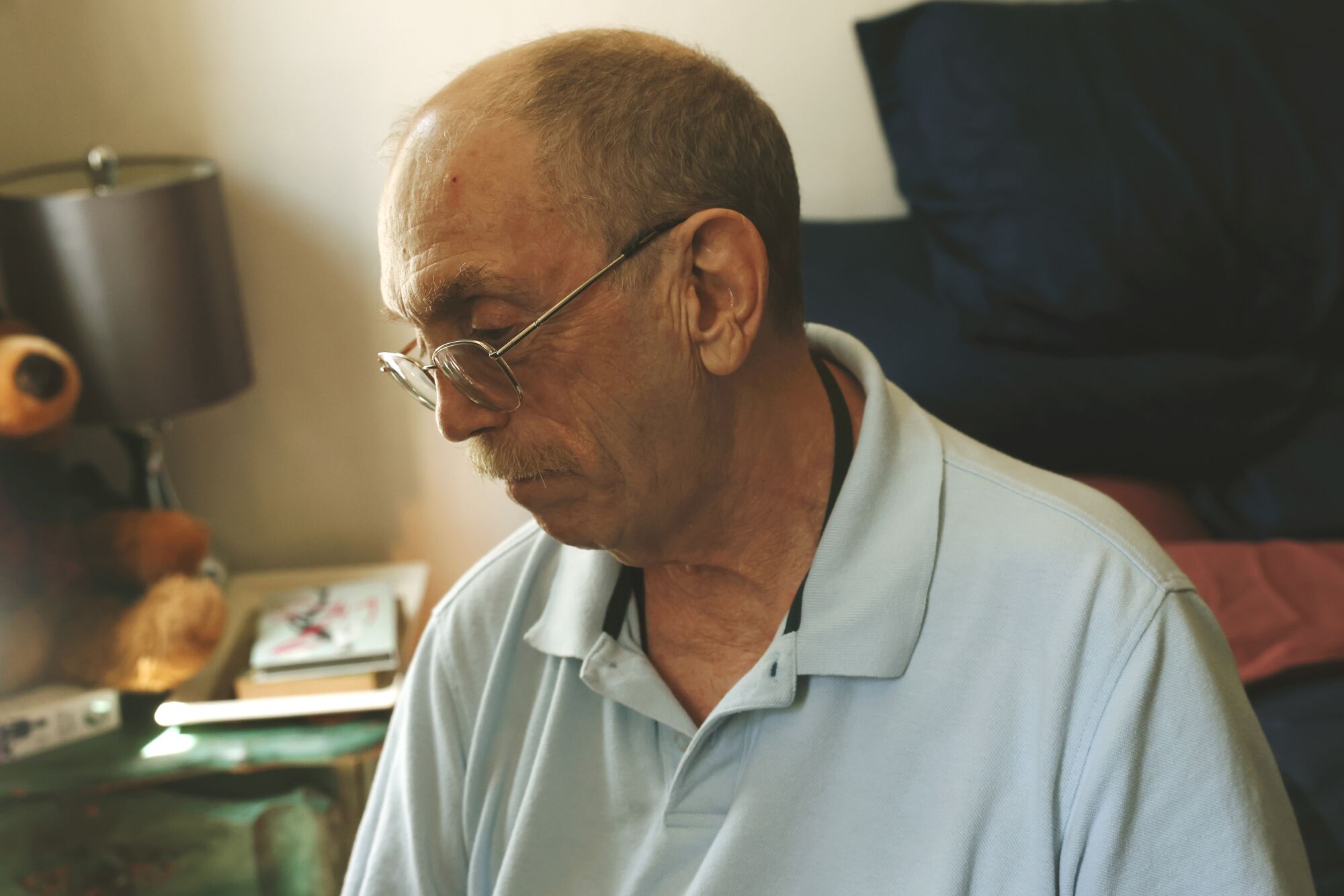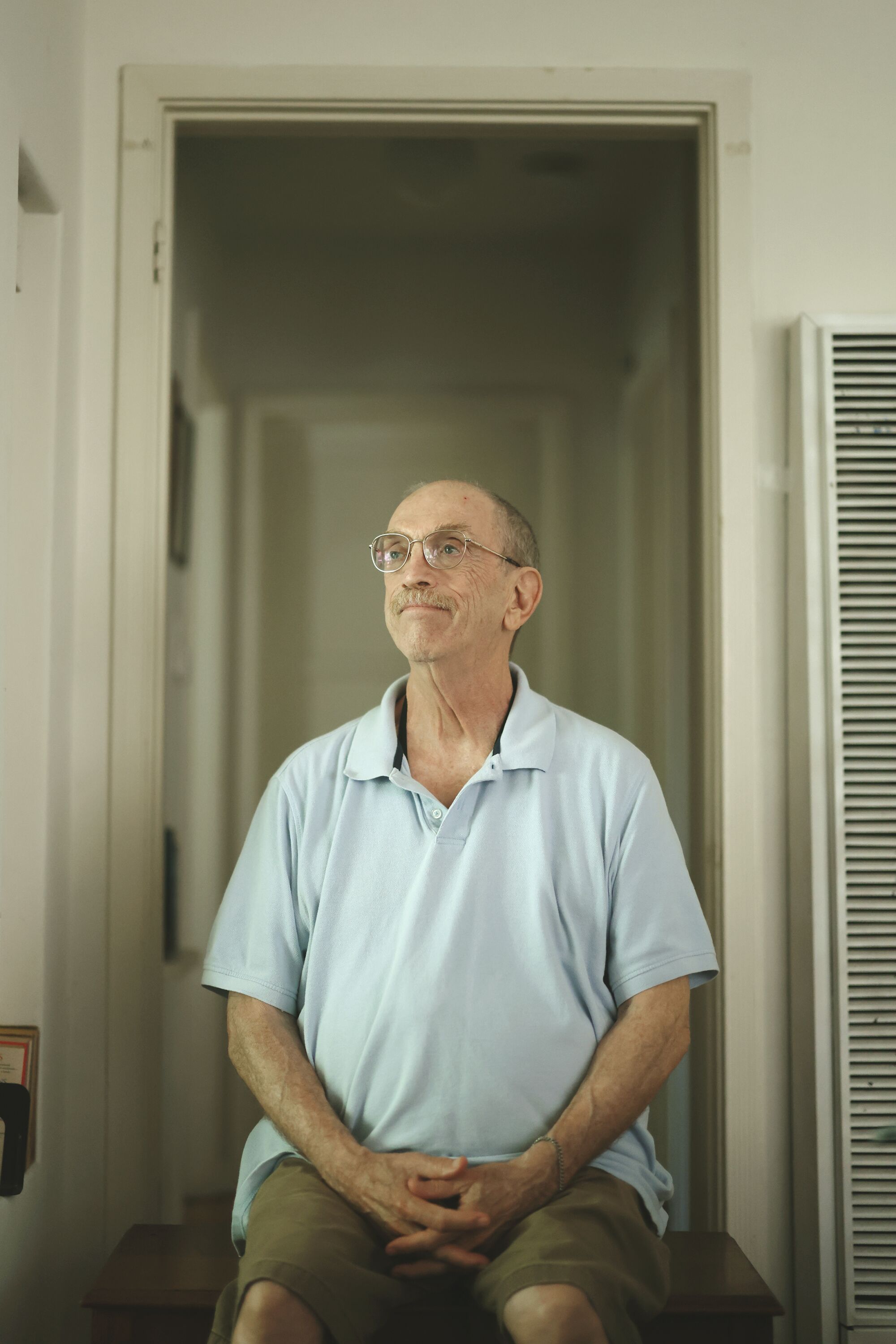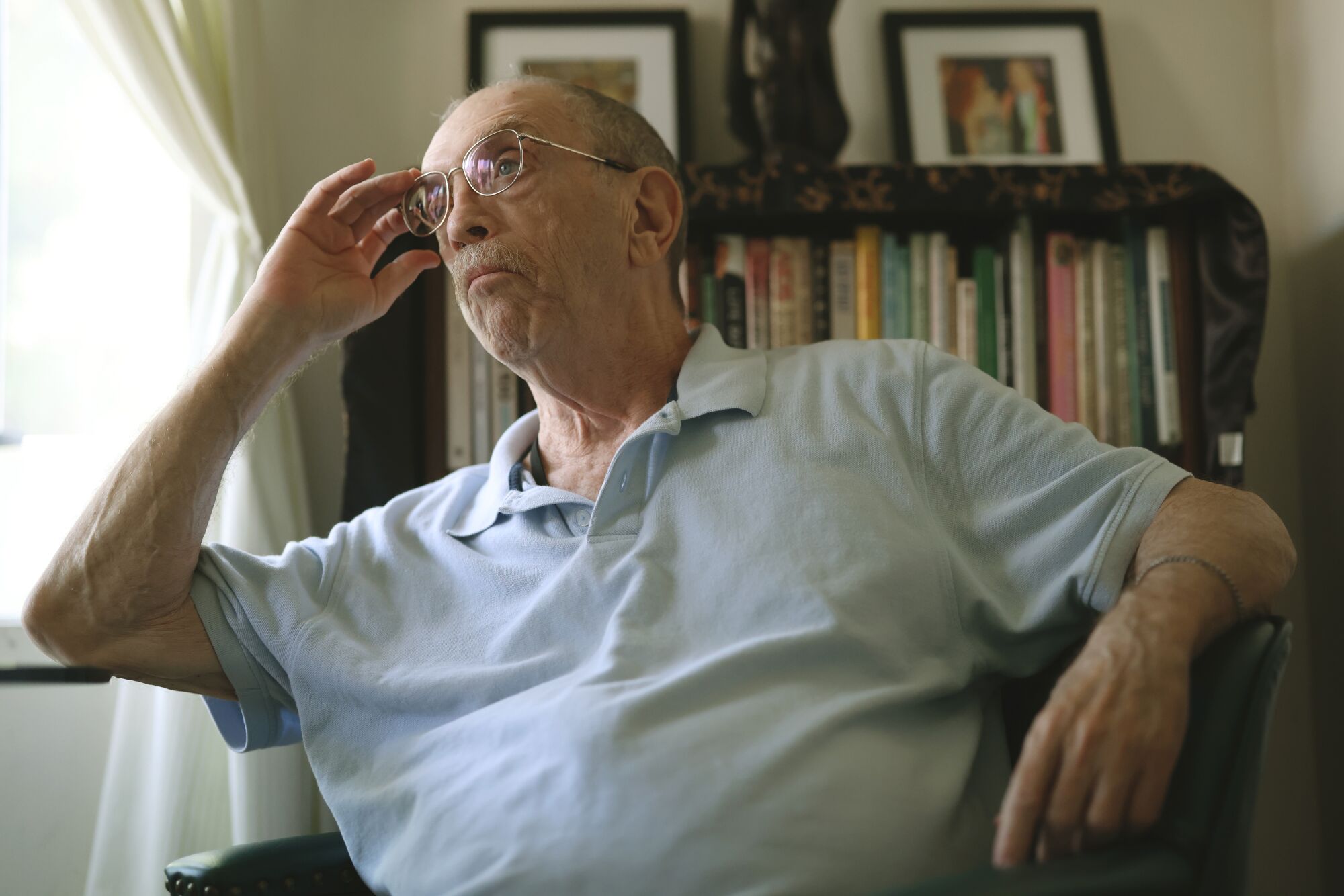Minutes before KABC-TV’s nightly news show “330” went on the air, the Rev. Steven Pieters wasn’t in the studio chatting with the other panelists. He’d been exiled outside, to a dark alley next to the AIDS Project Los Angeles office in Hollywood.
It was 1986, and Pieters was scheduled to participate in a five-member panel to discuss the state of the HIV/AIDS pandemic, at the height of the viral infection then wreaking havoc on LGBTQ+ communities. He had been diagnosed with HIV/AIDS four years prior and at one point was given only eight months to live.
Fearing the risk of transmission, the studio’s camera and production crew refused to work if Pieters remained in the studio. So while the rest of the panel touched up their makeup and indulged in concession snacks inside an air-conditioned studio, a production assistant slapped a lavalier microphone and sound buffer on Pieters’ buttoned-up cassock and led him outside.
Tuning into the program to discuss the HIV/AIDS epidemic via satellite, Pieters told viewers that AIDS patients weren’t monsters.

Rev. Dr. Steve Pieters, a longtime HIV/AIDS activist and survivor, speaks about his life during an interview at his home on Aug. 16, 2022.
(Dania Maxwell / Los Angeles Times)
“People with AIDS were considered to be the lepers of the time,” Pieters said in a recent interview at his Silver Lake home. “People just didn’t want anything to do with us.”
It was a time when gay, bisexual and transgender people were often demonized, and HIV/AIDS was shrouded in fear and silence. The first time the word “AIDS” slipped out of then-President Ronald Reagan’s lips in public was during a news conference — five years into the crisis.
When he received his own diagnosis, Pieters trembled at the thought of never being hugged, touched, even loved by someone else again. But through his work with the AIDS Project Los Angeles — and with a boost from a legendary live interview with televangelist Tammy Faye Bakker — Pieters became a national spokesperson and a rallying figure for AIDS awareness and gay political activism.
Since last year, Pieters and other gay men have been pushing back against the stigmas associated with a new illness, mpox, formerly known as monkeypox. The majority of reported mpox cases diagnosed worldwide have been with men who have sex with other men. Pieters has had flashbacks to the harrowing AIDS era.
“People are scared of having contact with us because, as far as people know, monkeypox can be transmitted by skin-to-skin contact, so hugging and kissing is a scary thing to do,” Pieters said. “That contributes to the soiled identity of gay men — even if we don’t have monkeypox.”
Ian W. Holloway, who serves as director of the Southern California HIV/AIDS Policy Research Center, said misinformation is one of the biggest problems in tackling such stigmas and can discourage vulnerable people from getting tested or vaccinated.
“The effect that it has is similar to the early days of HIV/AIDS because it kept people away from testing and treatment, and overall created a lot of shame and mental health challenges,” Holloway said. “It’s unfortunate to see those parallels play out.”
Pieters alluded to those painful parallels while accepting the Humanitarian Voice Award through the Gay Men’s Chorus of Los Angeles in August. During his speech, he lamented how LGBTQ+ communities continue to be pushed aside, one epidemic after the other.
When he first joined the Chorus, it was common to see choral members practicing their arpeggios while gripping their IV poles. In those days, humor was one of the few ways for the choir to cope — as Pieters showed when he received his award. Before he signed off the stage, he sang his version of Gilbert and Sullivan’s “I Am the Very Model of a Modern Major-General,” a signature tune from their comic opera “The Pirates of Penzance.”
“Now many years have passed and I’m as healthy as a horse can be/ It’s certainly a miracle for anyone with faith to see,” Pieters pitter-pattered in a heavy baritone. “But still in journals medical, in science and oncology,/ I am the very model of a medical anomaly!”
The audience hailed the satirical take.
“He’s been honored by so many different groups, but this was different because he was being honored by his friends and the people who’ve been there for him for years,” said Alison Arngrim, who met Pieters in the mid-1980s while her husband, Robert Paul Schoonover, volunteered for AIDS Project Los Angeles, after witnessing the moment.
The late ‘70s were a great time to be gay, Pieters said.
Harvey Milk had become the first openly gay man to be elected to public office in California. The counterculture movement had encouraged many Americans to experiment with new ideas about sexual and gender identity.
Growing up in Lawrence, Mass., in the 1950s and ‘60s, Pieters was fascinated by men but couldn’t explain why. When he admitted this to his father, who worked as a math teacher and varsity wrestling coach at the same prestigious prep school he attended, Phillips Academy, he was rebuffed.
“We don’t talk about that,” his father snapped.

Rev. Dr. Steve Pieters poses for a portrait at his home on Aug. 16, 2022, in Los Angeles.
(Dania Maxwell / Los Angeles Times)
Pieters learned to hide his thoughts and feelings about his sexual orientation. By the time he began college at Northwestern University, he was drinking himself to oblivion most nights, and didn’t stop after graduation.
It wasn’t until he was 23 that Pieters quit alcohol. Coming to terms with being gay, he felt his love for men pitted against his devout Christian faith. He couldn’t figure out how they could coexist.
Then he met a group of gay pastors from Chicago’s Metropolitan Community Church, a denomination founded in the late 1960s expressly to minister to LGBTQ+ Christians, the nation’s primarily LGBTQ+ Christian denomination, and found his home.
“I met my lesbian sisters and gay brothers,” Pieters said. “That’s when I knew God loved me, when I saw all these other lesbian and gay Christians, in loving relationships, and serving other people and being open and honest.”
When he became a pastor for the MCC church in Connecticut, Pieters routinely clashed with homophobic priests and ministers, either on television or in real life. He took note from the LGBTQ+ performers, public figures and politicians who made their names known, seeking to follow their examples.
When the first cases of what would later come to be known as HIV/AIDS were discovered among several gay men, many of those in the Christian community stigmatized it as a punishment for being gay.
“It was one of those things you have to laugh at or you cry,” he said. “It was really kind of sad that even though we knew how AIDS was transmitted, there was still a lot of fear, and it was based in ignorance.”
A year into the epidemic, his doctor delivered the news that made him tremble.
He was horribly sick for the first two years, including hepatitis, herpes and mononucleosis, and was eventually diagnosed with stage-four lymphoma and Kaposi’s sarcoma. His doctors predicted he wouldn’t live past 1985.
Two weeks later, Pieters was asked to preach the sermon at North Hollywood’s Metropolitan Community Church for their Easter service. He told those in the pews that, regardless of his diagnosis, he could still dance. Then he tapped out “Singin’ in the Rain.”
“I could still laugh. I could still feel fully alive even in the face of the illness — even in the face of death,” he said. “That’s what my faith taught me.”
As a gay minister, Pieters thought it vital to give consolation to gay men suffering with HIV/AIDS. He made videotapes on spirituality and urged congregants to be “present” with those with AIDS by sharing meals and laughs with them. He gave weekly aid and care by phone to dozens of male AIDS patients, and became involved with AIDS Project Los Angeles.
“It was just really a walking miracle,” said Rev. Keith Mozingo, who met Pieters while a guest pastor at St. John’s MCC in Raleigh, N.C. “That made an impression on me.”
The first time Pieters ever heard of the Gay Men’s Chorus of L.A. he was skeptical. The musical theater snob was eventually persuaded to attend a performance by a colleague, who scolded him for wanting to spend the night alone at his Silver Lake cottage home.
Two years into his diagnosis, and beset by blistering skin lesions, Pieters spent most of his time at home rewatching old Hollywood musicals. But it was the familiar verse from Gilbert and Sullivan’s “The Mikado” musical that made him sob as he watched hundreds of gay men harmonize:
“I am so proud / If I allowed / My family pride / To be my guide.”
From that first performance on, Pieters was hooked.
“It was the overall effect of seeing so many gay men proudly singing so beautifully,” he said.
Since the GMCLA formed in 1979, dozens of members had been diagnosed with HIV/AIDS. By 1988, the chorus had lost its musical director, Jerry Carlson, as well as 20 other members that same year. Eventually more than 150 members were lost to the pandemic.
“GMCLA’s history as an organization and musical ensemble is inextricably tied to the history of AIDS/HIV,” said GMCLA Executive Director Lou Spisto in a statement. “We became more vocal, more needed, and more present, during the peak of this crisis that affected our community and the world so directly for decades.”
Memorabilia from the AIDS era to the present is scattered throughout Pieters’ home. A framed photo of Peter Pan soaring across Neverland stands high above his wooden player piano. Next to it, his prized fairy wand rests upright.
For as long as he can remember, words like “pixie” and “fairy” have been used to mock gay men. Much of his work has served to reclaim and show the beauty of what it means to be homosexual. Instead of fighting the term, he rolls with it.
“I needed to own the title, and be proud of it, as a way of reclaiming images that have been used against us,” Pieters said.
It’s essential as the LGBTQ+ community faces the mpox crisis. Several studies of mpox, which is not classified as a sexually transmitted disease, have shown it to be far less lethal than AIDS. The L.A. County Public Health Department has reported that, out of more than 2,422 cases as of Dec. 27, only two resulted in death. There have been 29,740 confirmed monkeypox/orthopoxvirus cases across the nation, according to the CDC.
The public messaging around mpox also has been much more inclusive and non-alarmist than it initially was around AIDS, said Holloway, of the Southern California HIV/AIDS Policy Research Center. Although there are parallels, he said, it’s clear that government leaders are learning how to respond effectively in the face of this new viral threat.
“We’re learning more about public health, how to be better partners, to be community leaders and how to really work together to address this latest outbreak,” he said.
Pieters shares his advice and wisdom with younger Gay Men’s Chorus members through one-on-one chats and rehearsal chatter. He tells them to practice safe sex, to discuss their status with their partner and to share intimacy responsibly in the midst of an epidemic.

Rev. Dr. Steve Pieters, a longtime HIV/AIDS activist and survivor, poses for a portrait at his home.
(Dania Maxwell / Los Angeles Times)
“Young gay men can learn a lot from their elders who lived through the AIDS years,” he said.
Vaccines also have been made available across the region through clinics aligned with the Department of Public Health, such as the Los Angeles LGBT Center. Many gay men in L.A. have discovered vaccination opportunities through word of mouth, Pieters said.
“Information like that is so important,” he continued. “It’s like an underground railroad kind of for getting protection.”
Even so, many of those within the LGBTQ+ community have grown increasingly frustrated with the government’s response to the outbreak. It’s part of the reason why many California-based organizations are pushing for better access to testing, vaccines and plans to mitigate the disproportionate impacts on LGBTQ communities.
“The undersigned organizations have always and will always stand on the front lines battling for the safety and wellbeing of all our community. Since the first days of the AIDS epidemic, through COVID-19, and now in preparation for hMPXV, we will be ready,” said a letter sent to CDC Director Rochelle Walensky in late July on behalf of Equality California, Los Angeles LGBT Center, National Center for Lesbian Rights and San Francisco AIDS Foundation.
Decades after being diagnosed, Pieters is still learning and growing from the hardships he has endured. To him, it’s been the communities he’s built and mentored that have gotten him through those times.
They’ve taught him to never forget to sprinkle that pixie dust, or wave his wand — due north, toward Neverland.







